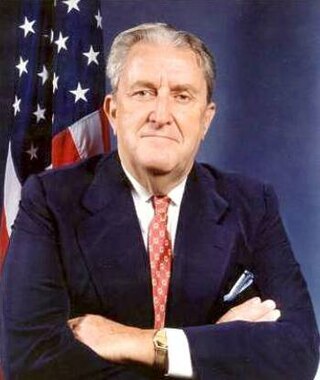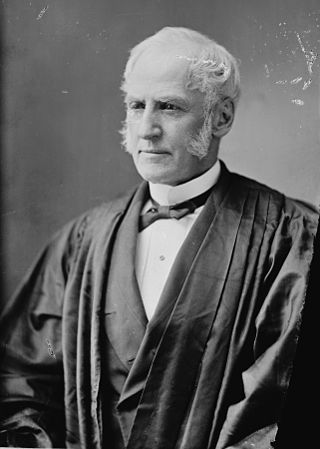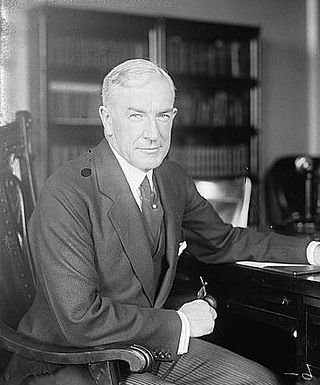Related Research Articles

Joseph William Martin Jr. was an American Republican politician who served as the 44th speaker of the United States House of Representatives from 1947 to 1949 and 1953 to 1955. He represented a House district centered on his hometown of North Attleborough, Massachusetts, from 1925 to 1967 and was the leader of House Republicans from 1939 until 1959, when he was ousted from leadership after the party's disastrous losses in the 1958 elections. He was the only Republican to serve as Speaker in a sixty-four year period from 1931 to 1995. He was a "compassionate conservative" who opposed the New Deal and supported the conservative coalition of Republicans and southern Democrats.

Michael Dean Crapo is an American lawyer and politician serving as the senior United States senator from Idaho, a seat he has held since 1999. A member of the Republican Party, Crapo served as the U.S. representative for Idaho's 2nd congressional district from 1993 to 1999. He is the dean of Idaho's congressional delegation, having served since 1993.

Vernon Anthony Walters was a United States Army officer and a diplomat. Most notably, he served from 1972 to 1976 as Deputy Director of Central Intelligence, from 1985 to 1989 as the United States Ambassador to the United Nations and from 1989 to 1991 as Ambassador to the Federal Republic of Germany during the decisive phase of German Reunification. Walters rose to the rank of lieutenant general in the U.S. Army and is a member of the Military Intelligence Hall of Fame.

Claude Denson Pepper was an American politician of the Democratic Party. He represented Florida in the United States Senate from 1936 to 1951, and the Miami area in the United States House of Representatives from 1963 until his death in 1989. He was considered a spokesman for left-liberalism and the elderly.

Ward Hunt was an American jurist and politician. He was Chief Judge of the New York Court of Appeals from 1868 to 1869, and an associate justice of the U.S. Supreme Court from 1872 to 1882.

William Arthur Purtell was an American businessman and politician. A member of the Republican Party, he represented Connecticut in the United States Senate in 1952 and from 1953 to 1959.

Henry Prather Fletcher was an American diplomat who served under six presidents.

Henry Howland Crapo was a businessman and politician who was the 14th governor of Michigan from 1865 to 1869, during the end of the American Civil War and the beginning of Reconstruction.

Philip Wilson Bonsal was an American career diplomat with the U.S. Department of State. A specialist on Latin America, he served as United States Ambassador to Cuba from February 1959 until October 1960, the first months of the Castro regime.

William Wallace Crapo was a member of the United States House of Representatives from Massachusetts. He was elected to fill the vacancy caused by the death of James Buffinton. He served slightly more than three terms in congress from November 2, 1875 to March 3, 1883

Francis Brockholst Cutting was an American lawyer and businessman who served one term as a U.S. Representative from New York from 1853 to 1855.

Frederick Nolting was a United States diplomat who served as United States Ambassador to South Vietnam from 1961 to 1963.

Major General Robert Walker Grow was a senior United States Army officer who commanded the 6th Armored Division during World War II. He was notable for his court-martial in 1951 for failing to safeguard classified information.

Robert Forbes Woodward was an American diplomat who focused on U.S. relations with Latin America. He served as United States Ambassador to Puerto Rico from 1954 to 1958, Ambassador to Uruguay from 1958 to 1961, and Ambassador to Chile in 1961.

Albert Gallatin Lawrence was an American diplomat and soldier.
William Sterling Byrd Lacy was an American diplomat who served as the third United States Ambassador to Korea from May to October 1955.
Wiley Thomas Buchanan, Jr. was an American diplomat and author who served as the Chief of Protocol of the United States and the U.S. Ambassador to Luxembourg and Austria.

The family of Dwight D. Eisenhower, the 34th president of the United States, and his wife, Mamie, consists predominantly of German and Pennsylvania Dutch background. They are related by marriage to the family of Richard Nixon, who was Eisenhower's vice-president, and was later the 37th president of the United States.

The following events occurred in August 1958:
Walter Howe was an American lawyer and politician from New York.
References
- ↑ "Walter Howe – People – Department History". history.state.gov. Office of the Historian, Foreign Service Institute United States Department of State . Retrieved 8 February 2021.
- ↑ "ERNEST HOWE, GEOLOGIST; Scientist, Politician and Banker Dies at Litchfield, Conn". The New York Times . 19 December 1932. Retrieved 8 February 2021.
- ↑ "Union completes merger with Litchfield bank". StamfordAdvocate. 2010-04-10. Retrieved 2018-09-27.
- ↑ "Margaret Howe Becomes a Bride; Editor of Litchfield Enquirer Married at Mother's Home to Herbert L. Crapo". The New York Times . 25 March 1945. Retrieved 8 February 2021.
- ↑ "Walter Howe Buried". The New York Times . 25 August 1890. Retrieved 8 February 2021.
- ↑ "Theodore Roosevelt's Tribute to Walter Howe". The New York Times. 6 September 1890. Retrieved 8 February 2021.
- 1 2 3 4 5 6 "WALTER HOWE, 58, DIPLOMAT, IS DEAD; Eisenhower Envoy to Chile Scored Castro Regime". The New York Times . 10 April 1966. Retrieved 8 February 2021.
- ↑ "BRIDAL IS PLANNED BY MARY JANE WILD; Denver Girl to Be Married on Nov. 14 to Walter Howe in Dedham, Mass". The New York Times . 25 October 1936. Retrieved 8 February 2021.
- ↑ "Walter Howe". Department of State Newsletter (59): 54. March 1966. Retrieved 8 February 2021.
- ↑ "ENVOY TO CHILE NAMED; Howe, Foreign Aid Official, to Succeed C. B. Lyon". The New York Times . 1 April 1958. Retrieved 8 February 2021.
- ↑ "SENATE BACKS ENVOYS; Approves Howe for Chile, Willauer for Costa Rica". The New York Times . 23 April 1958. Retrieved 8 February 2021.
- ↑ "Excerpts From the U.S. Letter on Cuba". The New York Times . 9 April 1960. Retrieved 8 February 2021.
- ↑ Onisspecial, Juan de (10 April 1960). "U.S. LETTER SPURS DEBATE IN CHILE; Eisenhower's Condemnation of Castro Stirs Students -- Manifesto Is Cited". The New York Times . Retrieved 8 February 2021.
- ↑ "MARY WILD WED TO A LEGISLATOR; Denver Girl Becomes Bride of Walter Howe of Litchfield, Conn, -- Reception Given". The New York Times . 15 November 1936. Retrieved 8 February 2021.
- ↑ "HOWE. JANE WILD HOWE (Age 93)". The Washington Post . November 16, 2006. Retrieved 8 February 2021.
- ↑ Commonwealth of Virginia: Certificate of Death for Walter Howe. Virginia, Death Records, 1912–2014. (Occupation: "Former ambassador to Chile.")
